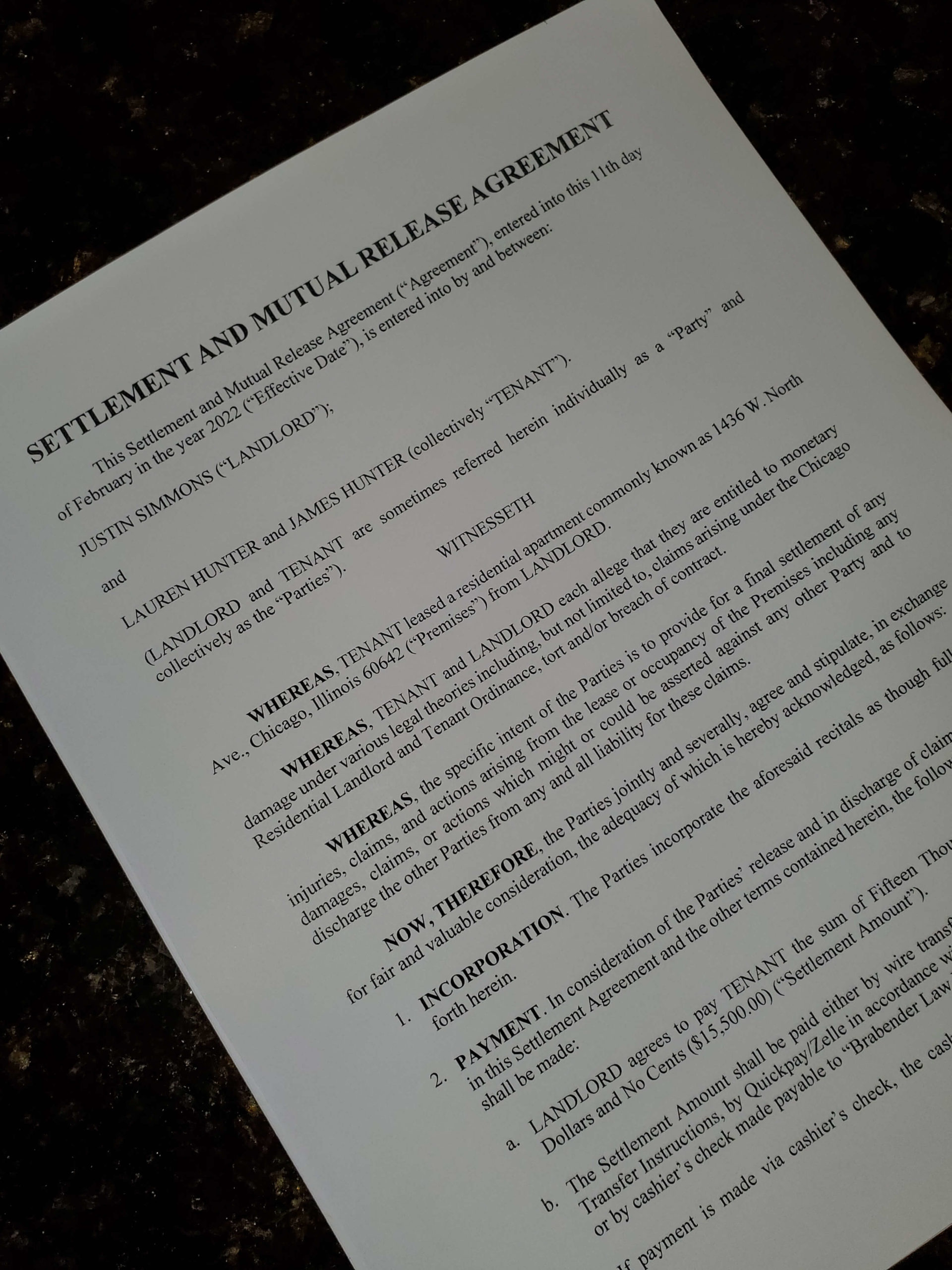get your Security deposit back
claim your free case review today
HOW IT WORKS
Most of my clients have never dealt with a security deposit lawyer before—so naturally, it's a little scary. Here is exactly how my process works.
Step 1: Complete the form
Enter your information and a brief summary of your dispute in the form at the top of the page. If you have a challenging schedule, feel free to include the best time(s) to call in the description box.
Step 2: Talk to intake
One of my intake specialists will call you to discuss your matter. During this short call, the intake specialist will ask you a number of questions to determine whether my firm can help with your dispute. If your dispute meets our requirements, we'll schedule a call with a security deposit attorney. If not, we'll decline your matter and there will be no charge.
Step 3: Phone consultation
I'll call you at the scheduled time. During the call I'll ask questions, evaluate your claim's risk profile, answer any questions you have, and discuss terms of representation. This usually takes between 30 and 45 minutes.
Step 4: Legal services agreement
If, after the phone consultation, we agree to move forward with representation, I will send you a legal services agreement to sign. If either of us decides not to move forward, you owe me nothing and our relationship ends.
Step 5: Representation
Representation can take different forms depending on the facts of your case. I often send demand letters, and I sometimes file cases in court. Whatever the case may be, I'll take the steps we discussed during your consultation to enforce your legal rights.
deposit theft is common
Every tenant has been there before. You've paid tens of thousands of dollars for rent, taken excellent care of your apartment, and maybe even used your own funds to make minor repairs. You've always paid your rent on time, and gave ample notice when you decided it was time to move on - but this wasn't enough to stop your landlord from stealing your deposit.
Maybe you thought you had a good relationship with your landlord, or maybe you knew he was shady all along. Whatever your expectations, a few weeks after moving out, you got that disappointing envelope in the mail.
From what you can tell, the landlord decided your security deposit was part of his revenue stream - or his vacation fund. He deducted for pre-existing damage, charged you for appliances that were decades old, used your money to put on a new coat of paint, paid someone to clean an apartment that was cleaner than the day you moved in. . . or even used your deposit to gut rehab the bathroom. (Trust me, we've seen it all). Whatever happened, it wasn't fair and you feel powerless.
Security deposit theft has existed for as long as there have been deposits. For some reason, it's really hard for landlords to hand back money that is already under their control. While many tenants throughout the country have no realistic ability to recover their deposit, Cook County is different.

the law is on your side
Most tenants in Cook County are protected by robust tenants' rights laws. The majority of Cook County is covered by the Cook County Residential Tenant and Landlord Ordinance, while Chicago, Evanston, and Oak Park have their own laws.
Each law has its intricacies, but, in general, the laws establish:
If the landlord makes improper deductions, fails to handle the deposit correctly, or does not return the deposit with proper documentation as required by law, the landlord will owe the tenant two to three times the deposit amount.
Of course, legal rights are hollow without a way to enforce them. Simply explaining the law to the landlord often results in laughter, disbelief, or hostility. Thankfully, Cook County thought of this, too. All local security deposit laws make the landlord pay a reasonable attorney's fee to the successful tenant. This way a security deposit lawyer can take a sound case with little to no up-front money.
Once hired, the deposit attorney uses their expertise to achieve an out-of-court settlement or, if necessary, vindicate the tenant's rights in court.
frequently asked questions
Good question (and a popular one)! In most cases we are paid from the money we recover from your landlord—think of those personal injury commercials where they say "No fee unless we win!"
Under both Chicago and Cook County security deposit law, it is a tenant’s right to have the landlord pay all attorney fees if the tenant is successful. Thus, our fee is tacked onto your claim and is paid by the landlord once we collect the funds. If we do not collect anything, we are not paid.
The primary exception to this is high-risk cases. If we feel your case is too high risk to handle on contingency, we may offer a non-contingency arrangement - which you are free to decline.
Fees are discussed in depth during the free phone consultation.
The value of a tenant's claim depends on what law applies and also whether there are claims beyond security deposit claims.
In general, the maximum claim value for a stand alone deposit case is 3x the deposit, plus fees and costs. If there are additional claims, this amount can be higher.
Most cases settle and most landlords expect a discount for a quick settlement. Moreover, often a tenant doesn't dispute that some damage was done or the tenant really wants to avoid court. All of these things can impact settlement value.
In my experience, it is extremely rare for a tenant to recover less than their full deposit, plus fees and costs. Most tenants receive additional funds ranging from a few hundred to a few thousand dollars.
All that said, when it comes to settlement, it is always the client's decision. No attorney can force settlement upon a client and the tenant can be as aggressive as they like.
Unfortunately, if the rental unit at issue is not located in Cook County we can almost never help. The reason for this is that security deposit law outside of Cook County is not tenant friendly.
We only help non-Cook tenants on an hourly basis and we understand most tenants are not willing and able to pay hourly attorney's fees.
Generally, the size of the building does not matter in Cook County. Most units from single family houses to high rises are regulated.
There are some situations where the law is different for smaller buildings, but this is something I will address if applicable.
The length of time a landlord has to return a security deposit depends on the location of the apartment.
In Chicago, a landlord has 45 days.
In Evanston, a landlord has 21 days.
In the rest of Cook County, a landlord has 30 days to return the deposit.
First off, deductions must be legitimate. That means the deductions can only be for unpaid rent and property damage beyond ordinary wear and tear. Landlords may not deduct for pre-existing damage, property improvements, or damage caused from normal use.
If there is a deduction for damage beyond ordinary wear and tear, the landlord must send a proper itemized list and paid receipts within the time frame set forth by Chicago or Cook County security deposit law.
Deposit deductions are limited to unpaid rent and property damage beyond ordinary wear and tear. A deduction for any other reason is a violation of the law.
Maybe.
If the tenant only allegedly owes rent for overstaying a day or two, then the case might be viable. Additionally, if rent is allegedly owed for failure to give sufficient notice of non-renewal, the claim may make sense. We evaluate these situations on a case-by-case basis.
We never take cases where the tenant owes a month or more of rent for time they actually resided in the unit unless the deposit was more than a month of rent. These cases are too risky for both the tenant and our firm.
Many tenants think they need to formally dispute deductions in writing to preserve or create a viable legal claim. This is not true. Once a landlord violates security deposit law, the legal claim exists.
Some tenants are able to resolve their claims informally with their landlord, but others harm their claims by making admissions, coaching their landlord on the law, or using foul language.
The best way to dispute deductions is to let a professional do it for you. Remember, this is one of the few areas of law where you don't need to hand over thousands of dollars to get professional help.
It is difficult to predict the length of a case, especially if it goes to court. This is because the landlord's posture and will to fight is the most important factor.
A case that settles prior to filing a lawsuit typically takes about two months from preparation of the demand letter until the tenant receives settlement funds.
A case that goes to court can take a year to 18 months on average, but a longer or shorter duration is possible.
Anything is possible in legal disputes, and attorneys are ethically prohibited from guaranteeing results. That said, we screen cases very carefully and have the experience to spot just about any weakness. One of the purposes of the free initial consultation is to evaluate any risks in the tenant's case and determine if moving forward is in the tenant's best interest. We aren't shy about telling a tenant their case is just too risky.
We like happy tenants (and like to get paid for our labor), so we only take cases we think will be successful.
The majority of cases never go to court, so those tenants will not see the inside of a courthouse. In fact, few tenants ever come in to the offices - the whole matter is handled over the phone and email.
If a case is filed in court, it is possible the tenant may have to come to court for an arbitration. If the case makes it to trial (this applies to a small percentage of cases that are filed), the tenant will almost always have to come downtown to testify (though video testimony has become more common due to COVID-19).
About Me
Hi. I'm Joseph Andrew Brabender IV (if you want to check my license), but I've always gone by "Andy." I'm a licensed Illinois attorney and have been practicing for about 15 years. My clients say that my greatest skill is breaking stressful and overwhelming problems into manageable, easy-to-understand plans that bring peace of mind; and achieve desired outcomes.
I have been using my unique skills to help Cook County tenants recover their security deposits since 2013. I am one of the most experienced security deposit lawyers in Cook County, having personally handled over 500 security deposit disputes. In addition to these cases, I have assisted other lawyers, judges, law students, legal aid agencies, and tenants thousands of times. Though I'm always working to make sure my legal knowledge is up to date, it's rare for me to encounter a security deposit pattern I haven't seen before.





